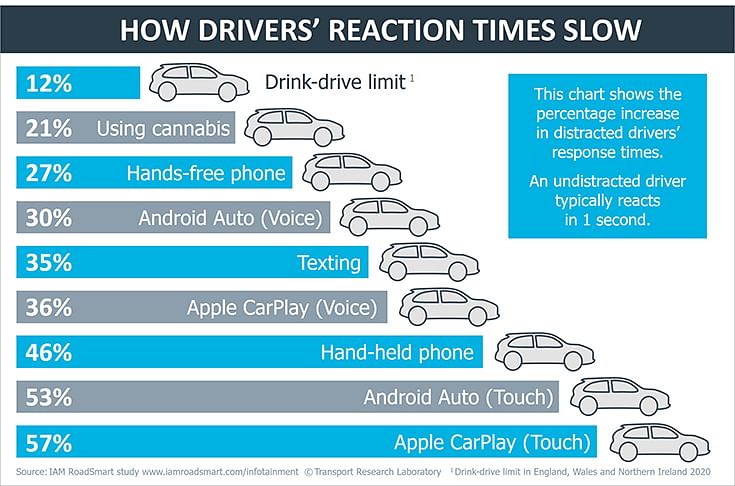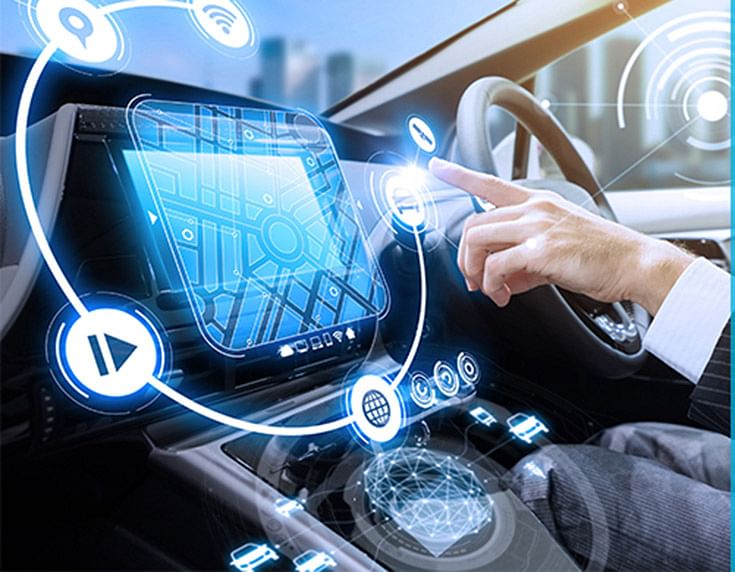In-vehicle infotainment systems impacting driving performance significantly: Study
New IAM RoadSmart study finds stopping distances, lane control and response to external stimuli all negatively affected by the use of Android Auto and Apple CarPlay; calls for further testing and the introduction of new industry standards for such systems
Worrying results from a new study released yesterday in the UK show that the latest in-vehicle infotainment systems, designed to improve road safety, are failing and impair reaction times behind the wheel more than alcohol and cannabis use.
Among the shocking results, the study – commissioned by the UK’s largest independent road-safety charity, IAM RoadSmart – found that reaction times at highway speeds increased average stopping distances to between four and five car lengths. The study also found that drivers took their eyes off the road for as long as 16 seconds while driving (equivalent to a distance of more than 500 metres at 70mph/112kph), and using touch control resulted in reaction times that were even worse than texting while driving.

Commenting on the alarming findings, Neil Greig, policy and research director, IAM RoadSmart, said: “Driver distraction is estimated to be a factor in around a third of all road collisions in Europe each year.
“While previous research indicates that Apple CarPlay and Android Auto perform better than more traditional buttons and controls, the results from this latest study raise some serious concerns about the development and use of the latest in-vehicle infotainment systems. Anything that distracts a driver’s eyes or mind from the road is bad news for road safety.
“We’re now calling on industry and government to openly test and approve such systems and develop consistent standards that genuinely help minimise driver distraction.”
During the study, which was undertaken by TRL on behalf of IAM RoadSmart, the FIA and the Rees Jeffreys Road Fund, drivers completed a series of three drives on the same simulated test route to assess the level of impact of Android Auto and Apple CarPlay. On the first run, drivers did not interact with the system. On subsequent runs, drivers interacted with the system using voice control only and then using touch control only.

The impact on reaction time when using touch control (rather than voice control) was worse than texting while driving, reveal findings of IAM RoadSmart study.
Both methods of control were found to significantly distract drivers, however touchscreen control proved the more distracting of the two. While many drivers realised the system was causing a distraction and modified their behaviour by, for example, slowing down, performance was still adversely affected with drivers unable to maintain a constant distance to the vehicle in front, reacting more slowly to sudden occurrences and deviating outside of their lane.
Neil added: “While we would like to see a review of these systems in the future, we’d encourage owners of vehicles fitted with these systems to use them in the safest possible way, including setting everything up before starting a journey.
“Most participants in the study report they use touch rather than voice control in real world driving. As the results clearly show, this is the most distracting, so if there is a need to use the systems while on the go, voice control is a far safer method.
“Individuals driving for work are just as at risk as the general public, so we would also encourage employers to review their advice and policies in light of this research.”
Key research findings
1. Controlling the vehicle’s position in the lane and keeping a consistent speed and headway to the vehicle in front suffered significantly when interacting with either Android Auto or Apple CarPlay, particularly when using touch control
2. Participants failed to react as often to a stimulus on the road ahead when engaging with either Android Auto or Apple CarPlay – with reaction times being more than 50 per cent slower
3. Reaction time to a stimulus on the road ahead was higher when selecting music through Spotify while using Android Auto and Apple CarPlay
4. The impact on reaction time when using touch control (rather than voice control) was worse than texting while driving
5. Use of either system via touch control caused drivers to take their eyes off the road for longer than NHTSA (National Highway Traffic Safety Administration) recommended guidelines
6. Participants underestimated by as much as 5 seconds the time they thought they spent looking away from the road when engaging with Android Auto and Apple CarPlay via touch control.
RELATED ARTICLES
Autoliv Plans JV for Advanced Safety Electronics With China’s HSAE
The new joint venture, which is to be located strategically near Shanghai and close to several existing Autoliv sites in...
JLR to Restart Production Over a Month After September Hacking
Manufacturing operations at the Tata Group-owned British luxury car and SUV manufacturer were shut down following a cybe...
BYD UK Sales Jump 880% in September to 11,271 units
Sales record sets the UK apart as the largest international market for BYD outside of China for the first time. The Seal...






 By Autocar Professional Bureau
By Autocar Professional Bureau
 18 Mar 2020
18 Mar 2020
 11617 Views
11617 Views












 Ajit Dalvi
Ajit Dalvi




